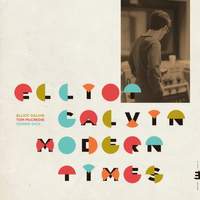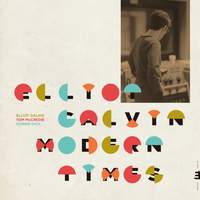Recording of the Week,
Elliot Galvin - Modern Times
Recording of the Week and Interview
 My Recording of the Week is Elliot Galvin’s Modern Times, a highly entertaining set of pieces for piano trio that was recorded direct to vinyl in the Netherlands. With the inspired support of long time collaborators Tom McCredie (double bass) and Corrie Dick (drums), Galvin manages to break free of the well-worn tropes of so many trio recordings and come up with something unique, shot through with his wry sense of humour. I recently spoke to Elliot about the recording process for the album.
My Recording of the Week is Elliot Galvin’s Modern Times, a highly entertaining set of pieces for piano trio that was recorded direct to vinyl in the Netherlands. With the inspired support of long time collaborators Tom McCredie (double bass) and Corrie Dick (drums), Galvin manages to break free of the well-worn tropes of so many trio recordings and come up with something unique, shot through with his wry sense of humour. I recently spoke to Elliot about the recording process for the album.
What was the inspiration for recording direct to vinyl?
Before making the album I had been making music using a lot of electronic instruments, synths and computers and things. I had become more and more disenchanted with making acoustic music, feeling distanced from that world. But then I was performing at the Montreux Jazz Festival and whilst there I saw Jason Moran, the great American jazz pianist, do a solo piano concert. I was completely blown away and it reminded me why I fell in love with acoustic music in the first place, especially that directness of communication, and I decided I wanted to do something that would capture that. Then I remembered that a friend of mine, Jorg (Mohaupt), had mentioned that he was setting up a studio in Haarlem in the Netherlands where you could record direct to vinyl and it seemed like the ideal way to record a completely acoustic record.
So there wasn’t any post-production involved?
No – there wasn’t any mixing, no tape, no added reverb or effect or anything. It’s just what you play in that moment transferred via the microphones directly to the cutting lathes. There were level faders that the engineer could adjust in the moment, because if we played too loud it might cut too deeply into the vinyl and cause a skip, or if we played too quietly it might not pick it up, but everything was 100% analogue. So, in a way there were four of us playing – us three and the engineer riding the faders. But absolutely no processing in between us and the vinyl.
You clearly like a challenge! Wasn’t it nerve-wracking knowing that you had to get everything right?
Strangely enough it ended up feeling like a gig. In a way it was easier than usual, as normally you go in to record and think “well, this morning we’re going to construct this and that, then we’ll do this etc” but when you’re cutting direct to vinyl you don’t have room to worry about all of that, it’s just the one take, so you just have to follow the energy and the flow of what feels right in the moment.
I found it interesting to compare this album with “The Influencing Machine” from last year, where you had lots of almost situationist/absurdist samples going on, and a strong sense of humour. Somehow you seem to keep that spirit, translating it into the purely acoustic language of the piano trio.
It’s interesting that you sense that element is still there. Making music for has always had a strong element of play for me, and I believe that if you don’t sit there wringing your hands and stressing over the meanings of everything, but instead see it as super-enjoyable and keep that important sense of play then hopefully that finds its way into the experience. Also when you try to be funny it rarely is, so for me it’s always been a more natural thing.
Which artists have influenced this side of your music?
The big one has always been Django Bates, both as an older pianist to look up too, and also his inherent sense of fun. Also, someone like Jennifer Walshe, who is an experimental composer – she did an opera called “XXX Live Nude Girls” that was all done with Barbie dolls and a trombonist. I take a lot of inspiration from outside of music as well. For example, I had watched the latest Twin Peaks series before writing this album. People tend to focus on the darkness in David Lynch’s work, but there’s also so much lighter, more hilarious writing. That contrast between his almost too bright and humorous material and the darker stuff has had an effect on me. The stand-up comedian Stewart Lee has also influenced me in the hilarious way he deconstructs his own material.
On the track Change I thought I heard a certain Keith Jarret influence, similarities with his playing with his American group with Redman and Motian?
Yeah – that’s funny as that track was almost directly influenced by Keith Jarrett – I had been listening to his album Facing You and there’s a piece he does with really fluid harmonic changes, and I remember thinking I would quite like to do something like that. You’re the first person to notice that so well done – exposed my secrets.
Thanks very much. I listen to a lot of new releases each week, and in doing so come across quite a few generic sounding piano trios. I appreciated that Modern Times avoids falling into the usual clichés.
I know what you mean because the piano trio is a very used format. I guess it’s the equivalent to writing for string quartet in the classical world, you can feel like everything’s been done as there have been so many great piano trios over the years. All of my previous albums had extraneous instruments added like kalimbas, toy pianos and synths, so when I committed to going the all-acoustic route I was thinking “oh my god, am I going to slip into some kind of generic piano trio sound”. I didn’t want to lose the unique thing I had carved out.
How much is pre-arranged and how much improvised on the spot?
With this album compared to other ones there was more room for improvising. Even the composed material, I tried to strip it back more, mainly due to the nature of how we were recording it, direct to vinyl. I didn’t want to be constantly thinking “ok, you have to nail this really intricate part now as it’s being recorded live”. It was more like, here’s the groove and the bassline, and I’m going to be doing these descending chords, and within that there’s loads of room for all of us to stretch things or ornament things. It definitely feels like there’s more improvising than on previous records.
How long have you played with Tom and Corrie?
Tom has been the bass player through all the albums I have recorded, and Corrie joined us for The Influencing Machine, but I have played with him in Dinosaur for years with Laura (Jurd) and we studied together at Trinity. Playing with those guys, it feels like home – we really know each other’s playing, and also as people, so it’s a beautiful environment to work in.
How do you feel you fit in with the current London Jazz scene?
There is a lot of media focus on it at the moment. I suppose I do feel slightly part of it, especially as I play with Emma Jean Thackeray who is part of that world, and I did a duo album with Binker (Golding). It’s great all of the attention that certain parts of the UK and London jazz scene are getting, but likewise there are some amazing artists working who don’t get so much attention, so how much of it is a media creation I am not sure.
I’ve heard you are going to be playing in a bunker?
Ha – not a bunker, it’s a disused tunnel shaft beneath the Brunel Museum in Canada Water, London. It has a grand piano in it, and they occasionally host concerts so we’re going to be holding our official album launch concert there on Wednesday 15th May. It should be quite a unique event.
Enjoy the direct transmission from the group to vinyl and then vinyl to your ears! Should you have it, you might care to turn off that "Concert Hall" setting on your system, lest you undo all the hard work.
Available Format: Vinyl Record
Fear not - as much love has gone into the CD version as the vinyl, and is the same direct expression of Galvin's compelling musical vision.
Available Formats: CD, MP3, FLAC, Hi-Res FLAC
More informantion on Elliot's launch concert can be found here here.




